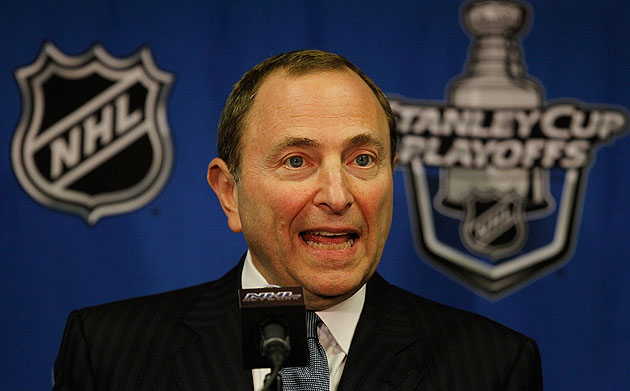 In case you were wondering if the National Hockey League was on the power play in their latest proposal to players, here's the equivalent of unleashing a Zdeno Chara slap shot: The NHL released the full contents of their proposal on Wednesday morning, in an unprecedented, cards-on-the-table move.
In case you were wondering if the National Hockey League was on the power play in their latest proposal to players, here's the equivalent of unleashing a Zdeno Chara slap shot: The NHL released the full contents of their proposal on Wednesday morning, in an unprecedented, cards-on-the-table move.
It was one made out of necessity, as news leaked all over about the proposal. But here it is, as the NHLPA received it. Kudos to the NHL for making it so.
A few of the highlights:
• The salary cap would be $59.9 million for the 2012-13 season; but seeing as how 16 teams are currently over that limit, the NHL will allow teams to go over that cap up to $70.2 million for this season only. The salary cap floor will be $43.9 million; every team in the League is over that floor at the moment.
• The rookie contract maximum is two years, unless a player plays a partial season in which case the contract will cover that season and two subsequent seasons. This is an attack on the "second contracts" for players, which have proven to be some of the most lucrative in the NHL and inflationary to the cap system.
• Hockey Related Revenue still needs "mutual clarification," which is no doubt still a sticking point for the NHLPA.
• Finally, this one:
Introduction of additional procedural safeguards, including ultimate appeal right to a "neutral" third-party arbitrator with a "clearly erroneous" standard of review.
That's right: Brendan Shanahan's massive suspensions (i.e. a "clearly erroneous" judgment on a player's actions) will be reviewed by a third-party arbitrator rather than the man who hired Shanahan to make the rulings, i.e. Gary Bettman.
Read the full NHL proposal …
Term:
Six-year Agreement with mutual option for a seventh year.
HRR Accounting:
Current HRR Accounting subject to mutual clarification of existing interpretations and settlements.
Applicable Players' Share:
For each of the six (6) years of the CBA (and any additional one-year option) the Players' Share shall be Fifty (50) percent of Actual HRR.
Payroll Range:
Payroll Range will be computed using existing methodology. For the 2012/13 season, the Payroll Range will be computed assuming HRR will remain flat year-over-year (2011/12 to 2012/13) at $3.303 Billion (assuming Preliminary Benefits of $95 Million).
2012/13 Payroll Range…
Lower Limit = $43.9 Million
Midpoint = $51.9 Million
Upper Limit = $59.9 Million
Appropriate "Transition Rules" to allow Clubs to exceed Upper Limit for the 2012/13 season only (but in no event will Club's Averaged Club Salary be permitted to exceed the pre-CBA Upper Limit of $70.2 Million).
Cap Accounting:
Payroll Lower Limit must be satisfied without performance bonuses.
All years of existing SPCs with terms in excess of five (5) years will be accounted for and charged against a team's Cap (at full AAV) regardless of whether or where the Player is playing. In the event any such contract is traded during its term, the related Cap charge will travel with the Player, but only for the year(s) in which the Player remains active and is being paid under his NHL SPC. If, at some subsequent point in time the Player retires or ceases to play and/or receive pay under his NHL SPC, the Cap charge will automatically revert (at full AAV) to the Club that initially entered into the contract for the balance of its term.
Money paid to Players on NHL SPCs (one-ways and two-ways) in another professional league will not be counted against the Players' Share, but all dollars paid in excess of $105,000 will be counted against the NHL Club's Averaged Club Salary for the period during which such Player is being paid under his SPC while playing in another professional league.
In the context of Player Trades, participating Clubs will be permitted to allocate Cap charges and related salary payment obligations between them, subject to specified parameters. Specifically, Clubs may agree to retain, for each of the remaining years of the Player's SPC, no more than the lesser of: (i) $3 million of a particular SPC's Cap charge or (ii) 50 percent of the SPC's AAV ("Retained Salary Transaction"). In any Retained Salary Transaction, salary obligations as between Clubs would be allocated on the same percentage basis as Cap charges are being allocated. So, for instance, if an assigning Club agrees to retain 30% of an SPC's Cap charge over the balance of its term, it will also retain an obligation to reimburse the acquiring Club 30% of the Player's contractual compensation in each of the remaining years of the contract. A Club may not have more than two (2) contracts as to which Cap charges have been allocated between Clubs in a Player Trade, and no more than $5 million in allocated Cap charges in the aggregate in any one season.
System Changes:
Entry Level System commitment will be limited to two (2) years (covering two full seasons) for all Players who sign their first SPC between the ages of 18 and 24 (i.e., where the first year of the SPC only covers a partial season, SPC must be for three (3) years).
Maintenance of existing Salary Arbitration System subject to: (i) total mutuality of rights with regard to election as between Player and Club, and (ii) eligibility for election moved to five years of professional experience (from the current four years).
Group 3 UFA eligibility for Players who are 28 or who have eight (8) Accrued Seasons (continues to allow for early UFA eligibility -- age 26).
Maximum contract length of five (5) years.
Limit on year-to-year salary variability on multi-year SPCs -- i.e., maximum increase or decrease in total compensation (salary and bonuses) year-over-year limited to 5% of the value of the first year of the contract. (For example, if a Player earns $10 million in total compensation in Year 1 of his SPC, his compensation (salary and bonuses) cannot increase or decrease by more than $500,000 in any subsequent year of his SPC.)
Re-Entry waivers will be eliminated, consistent with the Cap Accounting proposal relating to the treatment of Players on NHL SPCs playing in another professional league.
NHL Clubs who draft European Players obtain four (4) years of exclusive negotiating rights following selection in the Draft. If the four-year period expires, Player will be eligible to enter the League as a Free Agent and will not be subject to re-entering the Draft.
Revenue Sharing:
NHL commits to Revenue Sharing Pool of $200 million for 2012/13 season (based on assumption of $3.303 Billion in actual HRR). Amount will be adjusted upward or downward in proportion to Actual HRR results for 2012/13. Revenue Sharing Pools in future years will be calculated proportionately.
At least one-half of the total Revenue Sharing Pool (50%) will be raised from the Top 10 Revenue Grossing Clubs in a manner to be determined by the NHL.
The distribution of the Revenue Sharing Pool will be determined on an annual basis by a Revenue Sharing Committee on which the NHLPA will have representation and input.
For each of the first two years of the CBA, no Club will receive less in total Revenue Sharing than it received in 2011/12.
Current "Disqualification" criteria in CBA (for Clubs in Top Half of League revenues and Clubs in large media markets) will be removed.
Existing performance and "reduction" standards and provisions relating to "non-performers" (i.e., CBA 49.3(d)(i) and 49.3(d)(ii)) will be eliminated and will be adjusted as per the NHL's 7/31 Proposal.
Supplemental and Commissioner Discipline:
Introduction of additional procedural safeguards, including ultimate appeal right to a "neutral" third-party arbitrator with a "clearly erroneous" standard of review.
No "Rollback"
The NHL is not proposing that current SPCs be reduced, re-written or rolled back. Instead, the NHL's proposal retains all current Players' SPCs at their current face value for the duration of their terms, subject to the operation of the escrow mechanism in the same manner as it worked under the expired CBA.
Players' Share "Make Whole" Provision:
The League proposes to make Players "whole" for the absolute reduction in Players' Share dollars (when compared to 2011/12) that is attributable to the economic terms of the new CBA (the "Share Reduction"). Using an assumed year-over-year growth rate of 5% for League-wide revenues, the new CBA could result in shortfalls from the current level of Players' Share dollars ($1.883 Billion in 2011/12) of up to $149 million in Year 1 and up to $62 million in Year 2, for which Players will be "made whole." (By Year 3 of the new CBA, Players' Share dollars should exceed the current level ($1.883 Billion for 2011/12) and no "make whole" will be required.)
Any such "shortfalls" in Years 1 and 2 of the new CBA will be computed as a percentage reduction off of the Player's stated contractual compensation, and will be repaid to the Player as a Deferred Compensation benefit spread over the remaining future years of the Player's SPC (or if he has no remaining years, in the year following the expiration of his SPC). Player reimbursement for the Share Reduction will be accrued and paid for by the League, and will be chargeable against Players' Share amounts in future years as Preliminary Benefits. The objective would be to honor all existing SPCs by restoring their "value" on the basis of the now existing level of Players' Share dollars.
• • •
The final section here is a key one: Deferring payment on current contracts. Will the NHLPA actually trust the League to come through?
Donald Fehr responded to the offer in a letter to the players, as revealed by TSN's Bob McKenzie, including this bit on the last section:
"The proposal includes a "Make Whole" provision, to compensate players for the anticipated reduction in absolute dollars from last year (2011-12), to this year and next year. However, it would work like this. The Players Share in subsequent years would be reduced so that this "Make Whole" payment would be made. It is players paying players, not owners paying players. That is, players are "made whole" for reduced salaries in one year by reducing their salaries in later years."
Yeah ... this might not fly.
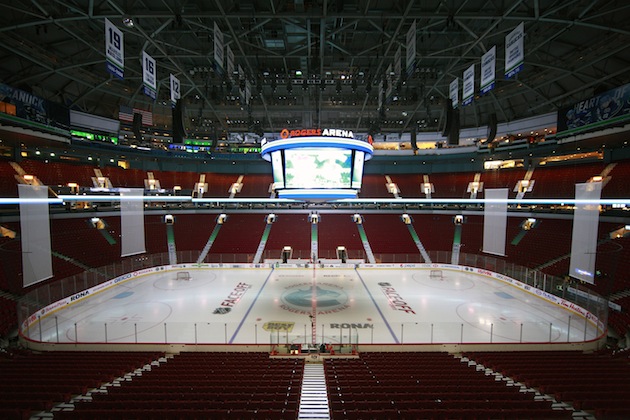 After two days of meetings between the NHL and NHLPA, the two sides have yet to agree to meatier parts of a new CBA and thus the league has gone forward with postponing another chunk of the 2012-13 schedule. As of Friday all games through Nov. 1 have been canceled.
After two days of meetings between the NHL and NHLPA, the two sides have yet to agree to meatier parts of a new CBA and thus the league has gone forward with postponing another chunk of the 2012-13 schedule. As of Friday all games through Nov. 1 have been canceled.
 Trending Topics is a column that looks at the week in hockey, occasionally according to Twitter. If you're only going to comment to say how stupid Twitter is, why not just go have a good cry for the slow, sad death of your dear internet instead?
Trending Topics is a column that looks at the week in hockey, occasionally according to Twitter. If you're only going to comment to say how stupid Twitter is, why not just go have a good cry for the slow, sad death of your dear internet instead?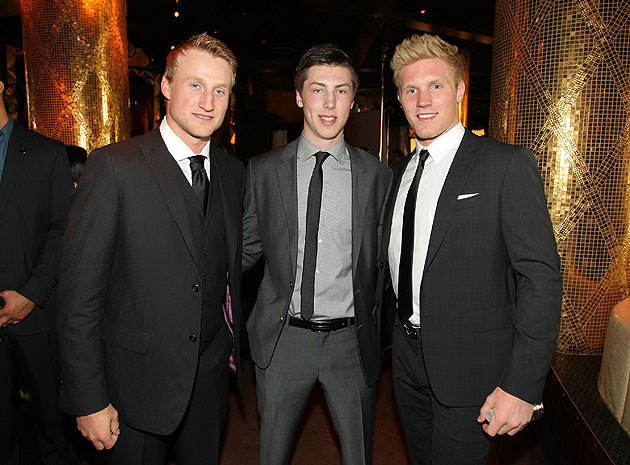 One of the most surprising elements of the NHL's CBA proposal to the players was on Entry Level contracts:
One of the most surprising elements of the NHL's CBA proposal to the players was on Entry Level contracts: It's been predestined since the start of negotiations: The next NHL Collective Bargaining Agreement is going to outlaw long-term contracts with creative, salary cap circumventing accounting.
It's been predestined since the start of negotiations: The next NHL Collective Bargaining Agreement is going to outlaw long-term contracts with creative, salary cap circumventing accounting. In case you were wondering if the National Hockey League was on the power play in their latest proposal to players, here's the equivalent of unleashing a Zdeno Chara slap shot: The NHL released the full contents of their proposal on Wednesday morning, in an unprecedented, cards-on-the-table move.
In case you were wondering if the National Hockey League was on the power play in their latest proposal to players, here's the equivalent of unleashing a Zdeno Chara slap shot: The NHL released the full contents of their proposal on Wednesday morning, in an unprecedented, cards-on-the-table move.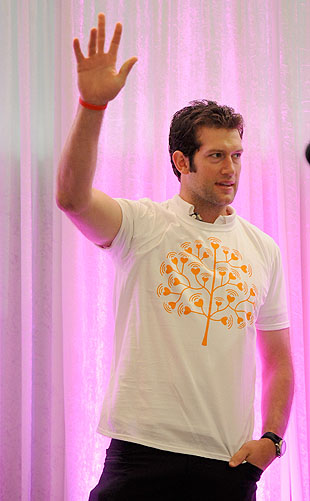 David Backes of the St. Louis Blues is an American hero and therefore speaks with authority on a great many things.
David Backes of the St. Louis Blues is an American hero and therefore speaks with authority on a great many things.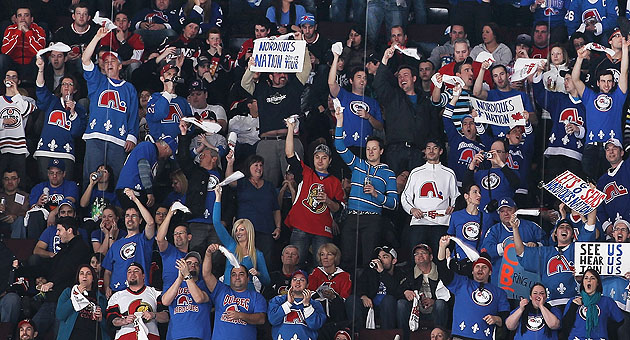 In the NHL's last proposal before the lockout started, the League offered a deal "in which the players get 49 percent of hockey-related revenue in Year One, 48 percent in Year Two, and 47 percent over the final four years," according to Mirtle.
In the NHL's last proposal before the lockout started, the League offered a deal "in which the players get 49 percent of hockey-related revenue in Year One, 48 percent in Year Two, and 47 percent over the final four years," according to Mirtle. You can understand Shawn Horcoff's frustration with the NHL lockout.
You can understand Shawn Horcoff's frustration with the NHL lockout.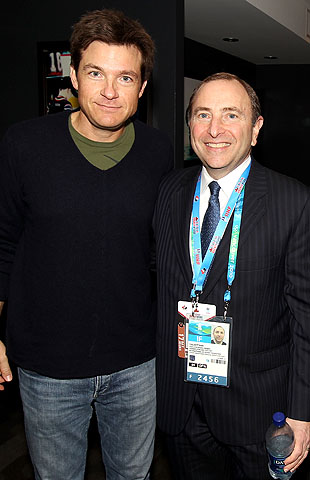 The NHL is headed to the NHLPA's turf for more collective bargaining on Tuesday, with the meetings taking place in Toronto.
The NHL is headed to the NHLPA's turf for more collective bargaining on Tuesday, with the meetings taking place in Toronto.
Recent Comments